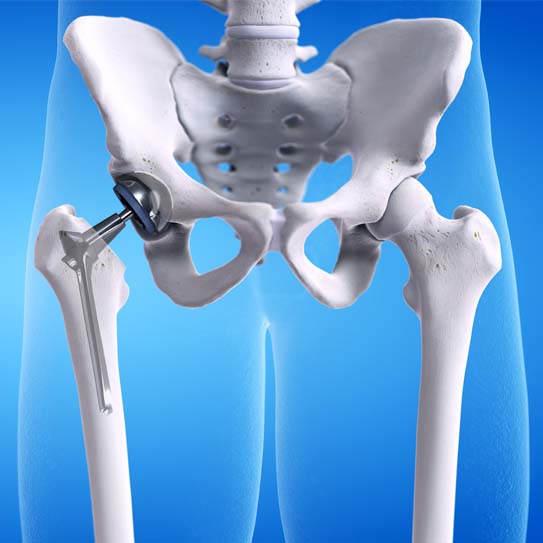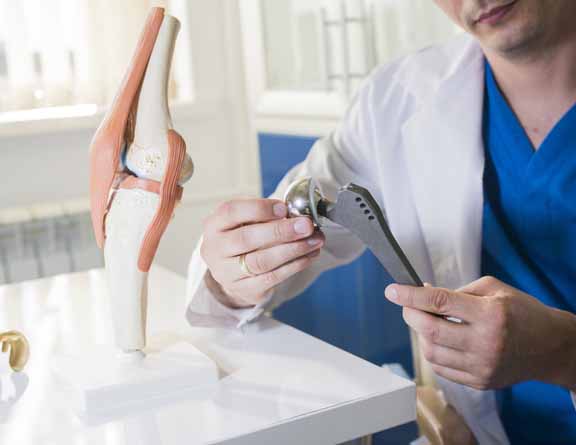
Bangalore
30 day free Phyisotherpy
Insurance Claims Support
No-Cost EMI
4-days Hospitalization
| Surgery Type | Recovery Days | Hospital Days | Age Group |
|---|---|---|---|
| Total Hip Replacement (THR) | 6 -12 weeks | 2-4 Days | Any age |
| Minimally Invasive Hip Replacement (MIHR) | 2 -6 weeks | 1- 3 days | Any age |
| Anterior Hip Replacement (AHR) | 2 -6 weeks | 1- 3 days | Any age |
| Partial Hip Replacement (PHR) | 6 -12 weeks | 2 -4 days | Typically older adults |
Pristyncare%20Clinic.webp)
Pristyncare%20Clinic.webp)
Pristyncare%20Clinic.webp)


Treatment
The orthopedic surgeon will ask you to have some tests before hip replacement surgery, including-
These imaging tests will help in better diagnosis of the condition, the surgeon will suggest the best suitable treatment option for you after evaluating your condition based on the test results.
The patient will be given general or spinal anesthesia so that he or she does not feel any pain or discomfort during the surgery. The orthopedic surgeon will make an incision over the outside of the hip, cutting through the skin and muscle. The surgeon may make 1 or 2 small incisions of 3 to 4 inches. Best uncemented implants are used during the procedure. With the use of the latest technology and surgical approach, the patient would be able to walk the next day after surgery. Orthopedic experts recommend undergoing physiotherapy for proper recovery after the surgery.
Best Healthcare Provider for Orthopedic Treatments
Minimally invasive knee replacement involves a much smaller incision of 4 to 6 inches, unlike traditional knee replacement, that involves a much longer incision of 8 to 10 inches.
Our Orthopedic Surgeons use the best prosthesis for joint replacement surgeries, such as Johnson & Johnson, Stryker, Zimmer, Smith & Nephew. Usage of the best quality implants for orthopedic procedures in order to promote longevity and durability.
The patient’s physiotherapy preferably begins after 10-12 days of surgery. For your smooth and precise recovery post knee replacement surgery, we will help you connect with the best Physiotherapist near you.
We offer follow-up consultations with the surgeon and provide instructions for post surgery care including dietary tips and exercises to our patients to ensure they have a smooth recovery.
You can start walking right from the next day after having your minimally invasive hip replacement surgery in Bangalore.
Minimally invasive total hip replacement is the most advanced hip replacement surgery in Bangalore.
Minimally invasive hip replacement surgery is performed under the influence of general anesthesia. The patient will not have pain during the surgery. The patient generally does not have pain after the surgery and has a speedy recovery.
Consult the best orthopedic surgeons for the most advanced total hip replacement surgery in Bangalore at Pristyn Care clinic.
An orthopedic doctor is the specialist you should consider for hip pain or other hip-related conditions (may it be an injury or degenerative hip disease like osteoarthritis). If you have chronic hip pain that has not resolved on its own and is affecting your daily life and activity level, you should visit an orthopedic doctor to learn about treatment options.
There are 5 main types of arthritis that can affect the hip joint-
Osteoarthritis is the most common type of hip arthritis.
There is no single specific cause of osteoarthritis, but there are certain factors that increase the risk of developing the disease, such as-
People with no above mentioned conditions or risk factors can still develop osteoarthritis.
Common symptoms of osteoarthritis of the hip joint are-
Hip resurfacing is a surgical procedure that can provide short-term relief while delaying a hip replacement. In a hip resurfacing surgery, the diseased surfaces of the hip joint are removed surgically and replaced with smooth metal covering. The entire femur bone is preserved in this procedure, which makes a future hip replacement surgery possible.
Hip hemiarthroplasty is the surgical procedure that replaces half of the hip joint. This procedure has proven to be an effective treatment for various types of femoral neck fractures for over 50 years. It is associated with low incidence rates of dislocation and infection.
Patients are typically discharged from the hospital 4 days after minimally invasive hip bone replacement.
Conventional hip replacement open surgery uses a large incision of 10 -12 inches while arthroscopic hip replacement surgery needs a small incision of 4 – 6 inch.
If your job involves a regular office setting, you might be able to return to work within 2 to 3 weeks after your hip replacement. However, if your job requires strenuous work, bending over, walking, a lot of exertion, use of heavy machinery or heavy manual labour, you will be advised to take a longer time off work.
Rehabilitation typically begins the same day or next day after the surgery.
Hip bone replacement has a 90% success rate in terms of stability of the knee joint, pain-relief, patient’s satisfaction, mobility and return to maximum activity.
Robotic hip replacement is the surgery where the orthopedic surgeon uses a robot during the hip bone replacement. The procedure is the same as a normal hip replacement surgery and involves using a CT scan (typically taken prior to the surgery) to produce a 3D (three-dimensional) model of the affected hip joint. The 3D model is then used to digitally plan the surgery based on the individual anatomy and condition of the patient, enhancing surgery precision.
The first robotic assisted hip replacement surgery was performed in October 2010.
Benefits of robotic hip replacement include-
You should call your surgeon right away if you notice symptoms of infections or complications after your hip replacement. Call your doctor right away if you notice-
After a hip replacement, the patient is advised not to put full weight on his knees and hips to ensure proper recovery. The risk of an injury or dislocation is also higher as the new hip might not be prepared to take the full weight of the body. A walker can be used by patients after the hip replacement to help provide stability to the new hip while moving while keeping it within the weight-bearing restrictions.
Hip replacement surgery can be performed using conventional technique (requiring a 10 to 12 inch incision) and minimally invasive technique ( requiring incision of 4 – 6 inch). As the minimally invasive hip replacement requires a much shorter incision, there is a lot less trauma or damage to the surrounding muscle and tissue, which promotes early recovery. Risk of infection and postoperative complications is also lesser in case of minimally invasive hip replacement. Most orthopedic surgeons prefer to use the minimally invasive approach because of its high success rate and benefits.
Total hip replacement or hip arthroplasty is the most common hip operation performed. Over 70,000 hip procedures take place every year in India.
Loosening or dislocation of the hip joint and difference in length of the leg are the most common complications after hip replacement.
During the hip operation, the patient is given IV (intravenous) fluids to replenish the body’s fluids and balance the sodium levels. The IV fluids can result in some bloating while the body regulates its fluid levels after the surgery. Although it can be uncomfortable, rest assured that a bloated stomach after hip replacement is a normal part of the recovery process and will subside on its own over time. If the problem still persists after a few days, you should speak to your surgeon.
Pristyn Care’s orthopedic surgeons prefer the most advanced procedure of minimally invasive hip replacement over the conventional hip replacement surgery in which 1 or 2 small incisions of 3 – 4 inches are made. The aim of the minimally invasive hip replacement surgery using smaller incisions is to reduce post-operative pain and ensure a speedy recovery. Unlike conventional total hip replacement surgery, minimally invasive hip replacement surgery is suitable and highly beneficial for all patients. Consult the best orthopedic surgeons to undergo minimally invasive total hip replacement surgery.
A patient has typically suggested a hip replacement surgery if he or she has had significant damage to the hip joint. Several health conditions can damage the hip joint, including-
Any such damage to the hip joint can be severely painful and might even interfere with the individual’s normal lifestyle and activities. Minimally invasive hip replacement surgery can help get relief from symptoms of the condition, recurring or constant pain, and improve the overall mobility and the overall quality of life. Minimally invasive hip replacement surgery is usually recommended to an individual if he or she still has significant problems and prevailing symptoms even after trying other non-surgical treatment options.
Minimally invasive hip replacement surgery is the modern procedure preferred by most orthopedic surgeons due to its less invasive surgical approach. During a minimally invasive hip replacement surgery, the surgeon makes a smaller incision of 3 to 4 inches, which is nearly half as compared to conventional hip replacement surgery. Benefits of undergoing minimally invasive include-
Consult the best orthopedic surgeons who specialize in minimally invasive orthopedic surgeries such as minimally invasive hip replacement surgery, carpal tunnel release surgery, ACL reconstruction surgery, etc.
Pristyn Care has many clinics across Bangalore. To consult our expert orthopedic surgeons for any doubts, concerns, or queries, visit the nearest clinic to know the solution. Book an appointment with the best orthopedic surgeons or book an online consultation and consult the doctor via a video call.
Patients suffering from the degenerative joint disease are advised to undergo prompt treatment. There are a number of treatment options for the degenerative hip disease, ranging from nonsurgical to surgical treatment. The treatment option for each patient is chosen based on several individual factors, such as age, activity level, the extent of cartilage loss the joint has experienced, and the effect of the disease on the patient’s life.
Different treatments for degenerative disease in the hip joint you that may discuss with your orthopedic doctor include-
Radha Raman
Recommends
Thank you very much Dr. S.D.I Ranjit for the care, concern and compassion in treating my hip pain with your innovative surgical skills. Thank you also to Ms Ayesha for her assurances and encouragement.
Radha Sundararajan
Recommends
I want to express my heartfelt gratitude for the surgery you performed for my 71-year-old mother. Your surgical expertise and dedicated team have set her on a path to a healthier future.
Sushant Anant Pai
Recommends
One of my friend referred Dr. S.D.I Ranjit, went to his clinic for my lip replacement treatment consultation. Very humble doctor with Smiling face always
Kirti
Recommends
Dr. S.D.I Ranjit is a very systematic and meticulous surgeon. I found him to be very straight forward and forthcoming in his thoughts and deed. He has done wonderful job as far as my husband’s surgery is concerned. Highly recommendable! Also a word of appreciation for his team. Very professional and approachable!
.svg)
.svg)
.svg)